How safe is it to travel to South Africa? 61 Safety Tips and Impressions from a White Couple

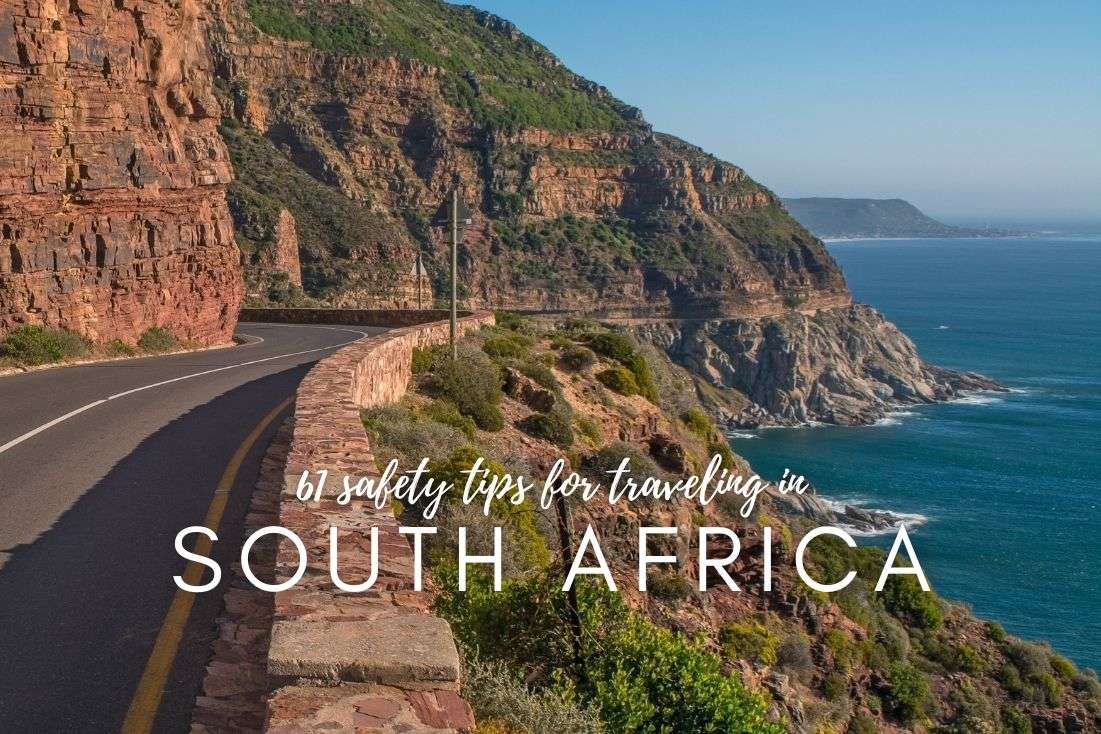
The question I get all the time is “Is it safe to travel to South Africa?” or even “How safe is South Africa for whites?”. Hey, we aren’t colorblind here at Next Level of Travel, it’s a thing, ok. Those safety hesitations aren’t surprising considering a quick Google search on crime in South Africa will pull up recent stats like: 70 a day were murdered and over 10,500 rape cases were opened in the first 3 months of 2023. It’s astonishing that South Africa gets any tourists at all!
You just need to read the fine print on safety statistics before you chicken out. You need to embrace South Africa with cautious optimism—the violent crime stats are bonkers (almost the highest in the world), but unless you’re in a gang, buying drugs, very poor and living locally (and hanging out with the wrong crowd), or are an extremely stupid tourist, you will be fine.
It’s not tourists getting murdered in South Africa, and safety issues didn’t bother me one bit during my multiple trips there. Ok, there are a few exceptions, but they are fairly easy to mitigate if you know what to look for and keep your wits about you.
You can stay safe even in Cape Town, on the roads, and in the presence of wild animals. Here’s how (no matter your skin color):
You could also be interested in reading:
- 2 Week + 3 Week South Africa Itineraries for Adventurous Travelers
- 23 Unpretentious Luxury Hotels in South Africa
- 30 FAQs and Tips for Planning Your Kruger Safari Visit
- 9 Epic Day Hikes on the Garden Route
- Cape Town Itineraries: Your Trip Plan for 3, 4, and 5 days
General safety tips for South Africa
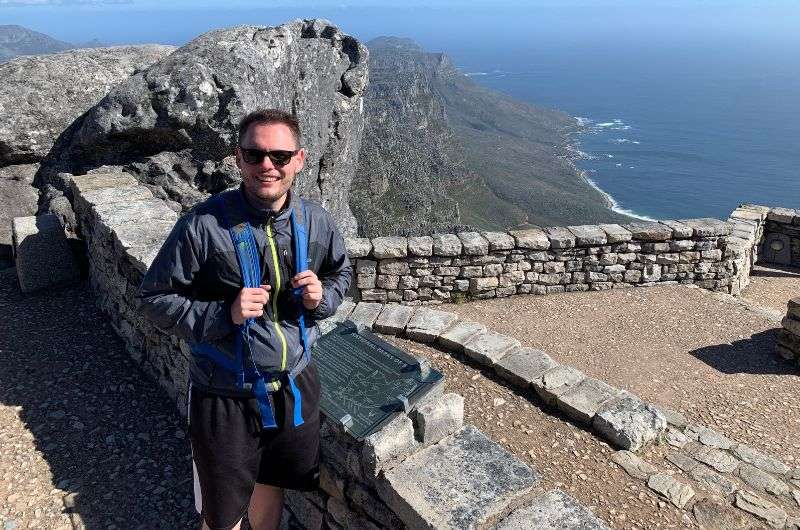
Let me give you some tips on how to stay safe in South Africa, my friends!
First, let's talk about the somewhat obvious but oh-so-important general rules for staying safe in South Africa. If you’re not following these then I can’t help you, and neither can anyone else. Good luck out there!
These golden nuggets of wisdom are not entirely exclusive to this country and are common sense in other parts of the world too.
So, pay attention and take notes:
- Stick to places where women and kids roam freely. It's like a safety badge, signaling that you're in a relatively secure environment. If you find yourself surrounded by a pack of men, well, let's just say it might be time to give your sixth sense a nudge.
- Keep your phone tucked away when you're venturing into unfamiliar territory. It may seem counterintuitive because you know you’re staring at your GPS, but you don't want to become an easy target for those pesky pickpockets, now do you?
- Leave your flashy bling at home. There's no need to parade your valuables and attract unnecessary attention. Trust me, you'll be just as fabulous without the added risk.
- When the sun goes down and then again at the crack of dawn, the streets can get uncomfortably quiet. It's like the perfect setting for an encounter with trouble. So, play it safe and stick to well-lit areas during these twilight hours. Or, you know, sleep.
- Not everyone you come across is a potential scoundrel, so keep your paranoia in check. Sure, there are a few bad apples out there, but the majority of folks anywhere in the world are decent human beings. Use your judgment and trust your instincts.
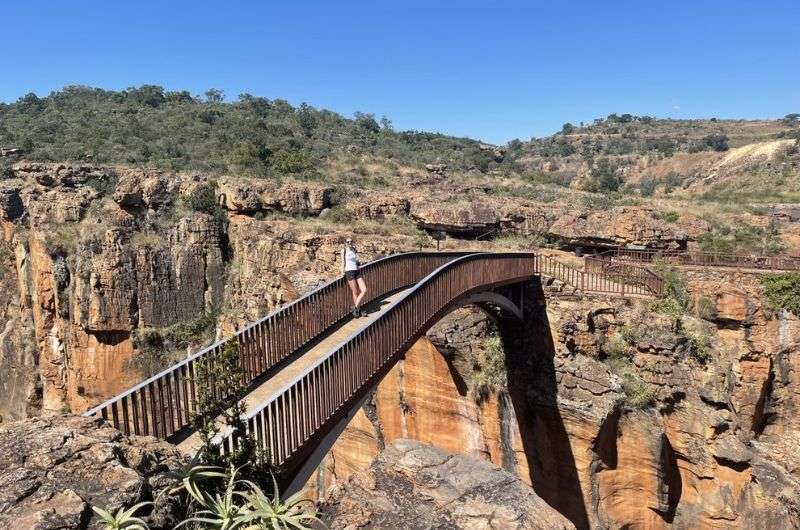
Feeling safe on the Panorama Route
- Now, let's talk about those township photo, especially the adorable but obviously not-well-off kids that love the camera ops (townships are the poorest areas where the most criminal activity takes place). Not only is it sick and disrespectful to walk around all entitled taking photos of those that are in a deep rut, but those innocent little ones might also come with some not-so-innocent company. Honestly even just visiting townships like they’re some kind of zoo seems off to me.
- Don’t hassle with anyone over what’s probably small change to you. Ask yourself: is it really worth the trouble? A parking guard (or is he?) demanding a fee, a police officer hinting at a bribe, or a beggar seeking loose change, sometimes it's easier (and safer) to just pay up and move on.
- Trusting Google Maps blindly for your navigation needs won’t cut it in South Africa. Double-check those routes, especially when traveling through national parks like Addo and Kruger. Avoid roads through townships; they may not be the scenic detours you were hoping for. It happened to us way too many times and it wasn’t comfortable.
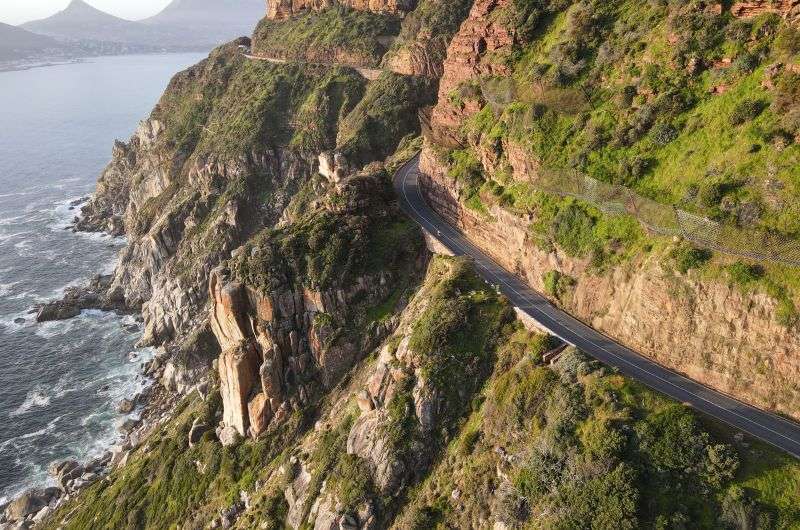
Google maps are not enough for South Africa
- While driving, resist the temptation to stop and assist strangers on the roadside. They might not be as innocent as they may seem, and you need to prioritize your own safety. Carjackings are a thing in South Africa. Some are cleverly staged, so just keep moving and lock your doors.
- When it comes to rental cars, bigger is better in South Africa. Think along the lines of a mighty Toyota Fortuner. The size and presence of a larger vehicle can make potential muggers think twice before messing with you.
- If you do get mugged, should you argue, resist, or unleash your inner superhero? No. Just focus on escaping the situation unharmed. Remember, things can be replaced. Keep calm, hand over your possessions, and carry on.
- For taxis, opt for the app-based ones. Hailing a taxi on the street might seem adventurous but can turn into something a little too hair-raising for comfort. With an app-based service, you'll have a digital trail of your ride and a (hopefully not false) sense of security.
- Last but not least, know the location of your hotel beforehand. Be strategic and not a penny-pincher, and in cities, choose accommodation in the more affluent areas of town. Safety loves good company.
- The emergency number in South Africa is 112.
Is South Africa safe for female tourists?
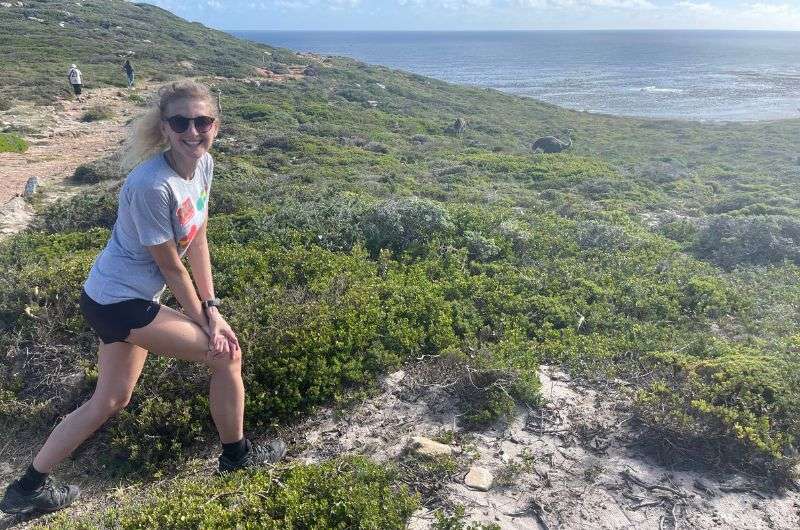
Women can do anything—and a safe visit to South Africa is no exception!
Yes, I’m a guy, but let me channel my inner feminist and try my best advising you on the matter of women traveler safety in South Africa. I always travel as part of a heterosexual couple, so I can attest to our experiences in this constellation (less on solo female travel).
- As long as you're not being reckless and tagging along with a gallant knight, you’ll be totally fine. I've witnessed no instances of harassment towards female tourists, particularly white women, who seem to be deemed off-limits by the locals.
- If you avoid venturing into the poorest areas aka townships, resist the temptation of black-only nightclubs, and for heaven's sake, refrain from strolling through the streets in the dead of night, there’s no reason to worry excessively about your safety, no matter your gender. Don't be foolish and expect everyone to be a knight in shining armor, because they obviously aren’t, but that’s true for even your own home country, too, I assume.
- To ease your stress even more, let me share a delightful bit of insight: South Africans are incredibly polite. You're more likely to be pleasantly surprised by their courteous behavior than anything negative. So, fear not, ladies, but exercise caution and be wise in your choices. I know you’ve learned a thing or two about the males of this planet, and the South African dudes are no different.
Cape Town safety for tourists
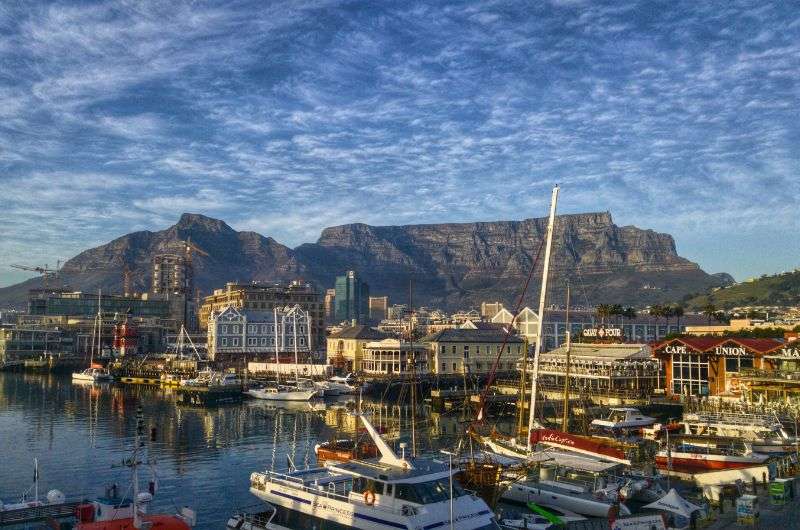
Cape Town port area
- Alright, Cape Town, listen up! I've got a map for you, highlighting the places to go and the ones to avoid. Yes, there’s a lot of black on it, but generally speaking, I probably felt more in danger in California’s LA than in Cape Town, so don’t go canceling your vacation plans just yet.
Remember, Cape Town's general population isn't as fortunate as us folks from Europe and the US. Some may go to extremes for what you consider worthless. Let's show a little compassion and understanding, shall we?
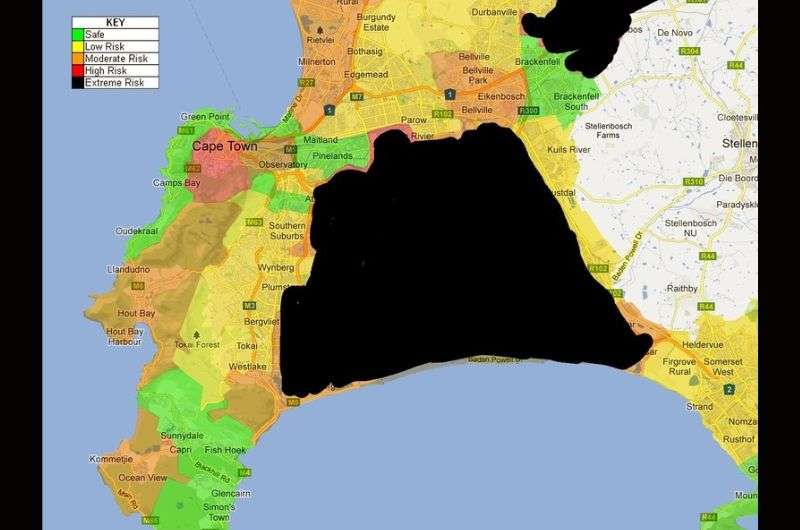
Stay out of the reds and blacks at all costs!
This city has its fair share of danger, ranking high in crime statistics. You'll find violence against women, armed robberies, muggings, and a touch of drug-related chaos. To keep things in perspective though, most of this trouble sadly happens in the local townships where the poorer residents live, and you have no business going to these places in the first place. Why would you go actively looking for trouble?
During daylight hours you will very unlikely meet any danger in the touristy areas of Cape Town (like around Cape of Good Hope or the Victoria & Alfred (V&A) Waterfront).
Hotels in Cape Town that I can vouch for: Home Suite Hotels Station House, The Glen Boutique Hotel & Spa, Kronendal Heritage. Here’s my article on all my hotel recommendations in South Africa.
- Here are three golden rules to keep you safe:
- Stay far away from townships and don’t mingle with vagrant people (bums, to put it simply). It's like a rule etched in the ancient scrolls of common sense.
- Nighttime and dawn adventures? No, thank you. Stick to the well-lit areas during your nocturnal escapades.
- Don't flaunt your expensive things. It's like waving a "Steal Me!" sign in front of those opportunistic thieves.
- I’d say the only exception to my perception of safety in Cape Town is stopping at traffic lights. There will be beggars eyeing your hard-earned cash. They’re not nice about it, either. It's MY MONEY, darn it! Roll up those windows, lock those doors, and escape unscathed, leaving them in the dust.
Road safety in South Africa
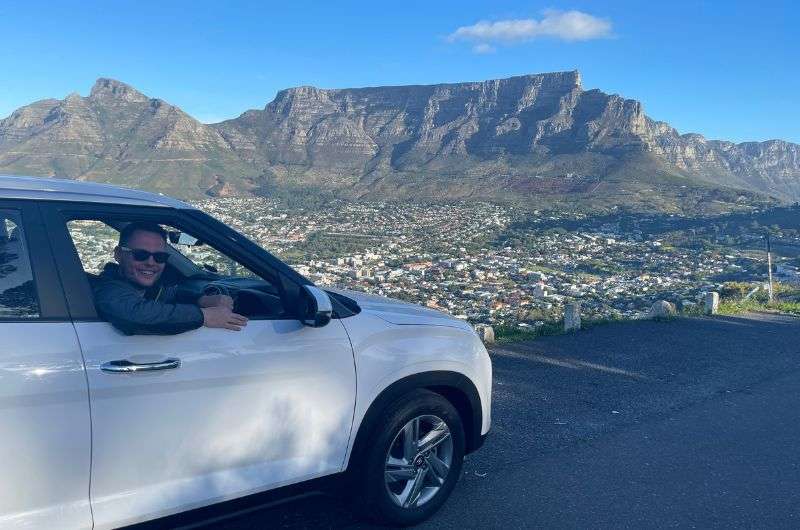
Driving in South Africa is comfortable... just keep those doors locked and don’t trust Google Maps when it takes you through the boonies
- I’m happy to report that the local drivers are kind and courteous, and that the rental cars were in tip top shape, too. You may be surprised to learn that the infrastructure in South Africa is top-notch, too, reaching European levels of awesomeness, so it’s actually really safe and comfortable to drive in South Africa. Highways are a breeze, so no need to worry about dodging potholes... well, except for the occasional surprise on rural roads, but nothing too serious.
- Here's an interesting fact: South Africans, despite their politeness behind the wheel, have one of the highest mortality rates on the road. It made no sense to me when I saw their great roads and lack of road rage. So I have a theory:
It all boils down to the state of their cars. Picture this: two cars collide in the US, you might have 1 or 2 casualties. But in South Africa? You're looking at easily 10 or more lives lost. You’ll understand the reasoning once you see the minivans packed to the brim with people, rolling around in a questionable technical state.
Now, let's dive into some survival tips:
- Don't stop to help someone on the roadside. Flat tire? Sorry, buddy, you need to call roadside assistance. Trust me, it's an easy scam waiting to unfold. Similarly, if there’s something blocking the road, like branches, drive around it and don’t stop. Carjackings happen often in South Africa!
- You can come across problems in cities, too. At a red light or in slow traffic it’s super easy for a criminal to try to open your door or reach into your car through your window. Keep windows closed and doors locked at all times.
- Keep valuables out of sight and out of reach in vehicles. It goes without saying if you’re leaving your car parked somewhere, but it’s easier than you think for a clever bad guy to take your cell phone from your seat at a traffic light (or the gas station).
- Avoid driving through townships aka the slums. Stick to the safer routes and spare yourself the unnecessary excitement.
- Rent a big car. Not only does it give you that extra peace of mind, but it also adds a dash of "I'm ready for anything" to your road trip persona. Nobody’s going to mess with you in your big truck.
- Expect police encounters. You’ll likely find yourself pulled over for minor infractions, and they'll test your patience with some bribery dance. Here's the secret: Pay the requested amount (around R 200-500, about USD 10–25), play it cool, and get back on your merry way. It's like a bizarre performance art piece on the side of the road.
The police were always very nice to me, and even when asking for a bribe managed to keep a smile on both of our faces. So one minute I’m giving him a bribe and the next minute I’m engaged in a conversation about the best road to take to Kruger and what to see there, all with the same policeman. Well, that’s South Africa for you.
- Brace yourself for trucks doing extremely stupid things. We met a truck doing the most ridiculous U-turn on a highway. I kid you not, it was busy, in the middle of the day, two trailers swinging from one lane to another in opposite driving directions. It was hilarious and unbelievable at the same time.
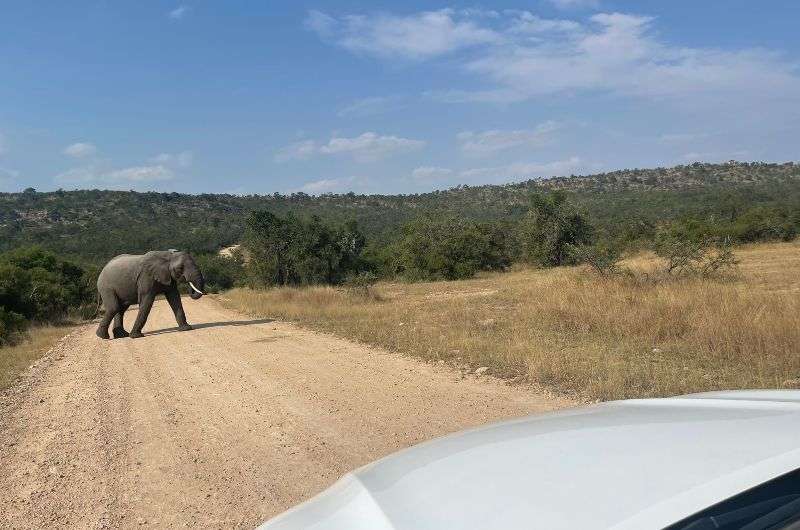
This elephant didn't care about us. But I was still prepared to make a quick exit if we happened to fall out of favor with him
- Now, let's talk roadkill. South Africa is home to abundant wildlife, way more than in the US and Europe. Take care, especially near national parks and safaris (read about the incredible Kruger National Park). You need to keep your eyes peeled for animals near the road that could get you both in trouble. We had quite a few close calls ourselves—an elephant, a zebra, a tortoise, and a few snakes, all trying to see if they have the right of way.
- Don't blindly follow your GPS. It has no fear and no judgment to keep you outside of shady areas. The shortest route is not always the one you want to take! We made that mistake a few times, navigating perilous roads near Kruger and Addo. Take the highway if you can, double-check your surroundings, and ensure a smoother journey.
Tourist scams in South Africa
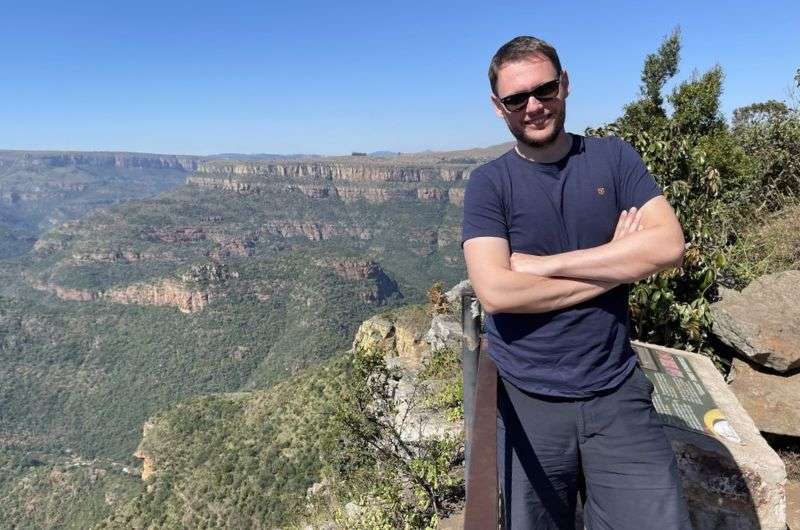
We felt safe driving the Panorama Route
While you probably won’t be a victim of the most terrible crimes, petty theft and scams are pretty common in South Africa. If you’ve traveled a lot before, your red flag radar will sound at the first encounter, but for others, these scams might not be so obvious:
- ATM machines. It’s probably obvious, but choose ATMs in frequented areas (the best are at hotels or banks) and don’t withdraw money at night. If someone tries to assist you while you’re withdrawing money, it’s a red flag. Some ATMs have guards on duty, so you may want to pick those (if you can tell that the guard isn’t a fake).
- Fake guides in national parks. If you want to hike with a guide, make sure they are official and not just a fony. Otherwise they might take you not to nice viewpoints, but to where their buddies are waiting to rob you. This is quite a common occurrence at Table Mountain and in the Drakensberg Mountains.
- Very friendly locals. This can be a tough one since South Africans are naturally friendly, and I warn against being too paranoid, but if someone’s being too chatty and goes in for that handshake too quickly and too intimately, they’re likely pulling your wallet out of your bag in the meantime.
- The flat tire scam. This has many variations and I’ve written about this scam above, but the general gist is that someone looks like they’re stranded on the side of the road and are waving you down to stop and help them. When you do, they hop into your vehicle and steel it, and you can be happy you make it out alive. Whatever you do, don’t stop your car. On traffic lights, keep doors locked and windows closed.
- “You dropped my phone!” Particularly popular in Cape Town, if a local asks you to take their picture, think twice. They’ll pose, you’ll take their photo, and everything’s good until you give them back their camera or phone. They’ll drop it and make a scene, demanding you give them money for breaking it.
Hiking safety in South Africa
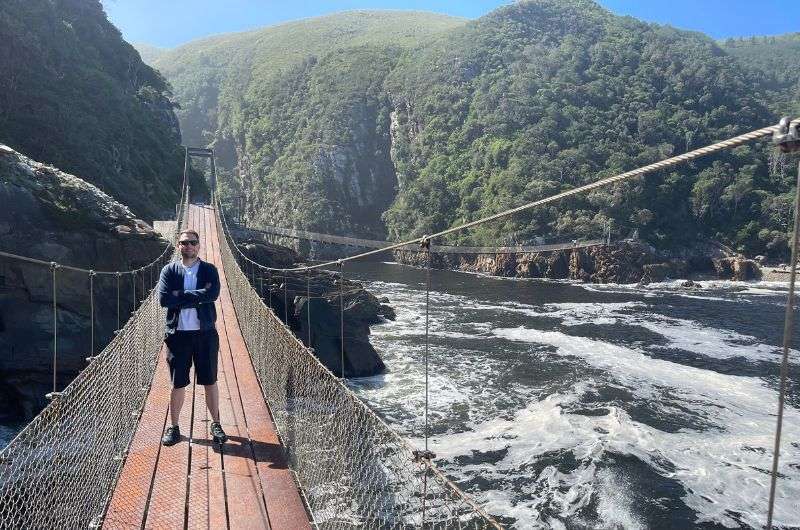
In South Africa, the hikes are very adventurous (Garden Route)
Let's debunk some of the fear-mongering nonsense you might come across while researching your South African vacation. Trust me, hiking here is an experience you don't want to miss.
Brace yourself, because this ain't Austria, folks! There are some extra rules, but it’s nothing that should keep you grounded and walking around your house. You know what they say, “Nothing ventured, nothing gained!“.
- Hike in groups of two or more. Not only will you have company for those entertaining trail stories, but it's also a smart move to deter any potential troublemakers. It's much harder to rob or engage in nefarious activities when faced with a group of hikers armed with witty banter.
- Stick to hiking in national parks. South Africa’s national parks are often very remote, which often means no locals and lots of other tourists instead, ensuring a safer environment.
- Forget about chasing after those hidden gems on your bucket list. South Africa isn't the place for exploring the unknown if you want to ensure your safe return. Trust me, stick to places that are on other peoples’ lists as well unless you want to end up in a creepy cellar instead.
- You don’t need to worry too much about exotic illnesses. Yes, there's the occasional presence of malaria in the northeast, but it's pretty scarce. Just pack your bug spray and take necessary precautions, and you'll be fine.
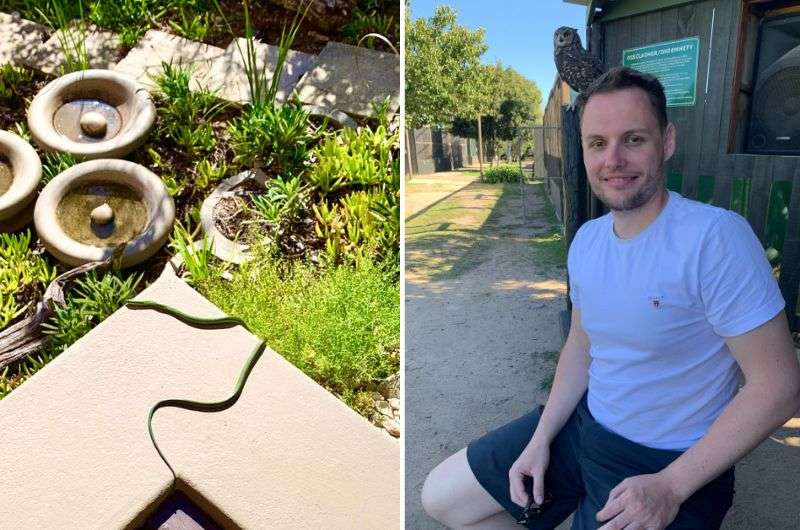
On the left, I accidentally took a very close-up photo of one of Africa's most venomous snakes. On the right, I took a liking to this little owl guy
- Watch out for snakes! These creatures are as dangerous as they are stunning in South Africa, and they're everywhere (we even encountered the deadly boomslang). And while that makes snake enthusiasts like me happy, I can see that not everyone will be jumping for joy. Make noise while hiking and keep your distance, and they'll do the same.
- The African sun is a mighty force. Don't forget your sunscreen and cover your skin, because South Africa is no place to mess around with a sunburn. Take a look at the locals' skin tones—those shades didn't come from snow, that's for sure.
- Finish your hike at least an hour before dusk. Things can escalate quickly when the sun goes down, and the dynamics of the surroundings can change rather fast. You don't want to cross paths with unexpected visitors like wild animals or, heaven forbid, wild humans.
- Pay attention to the trail markings. Trust me, I've accidentally ventured off the beaten path numerous times and found myself teetering on the edge of a 30-meter cliff during the Otter Trail in the Garden Route. And that wasn’t the only time I was lead astray, so pay extra attention to where you’re going.
Safety in safaris generally and Kruger NP specifically
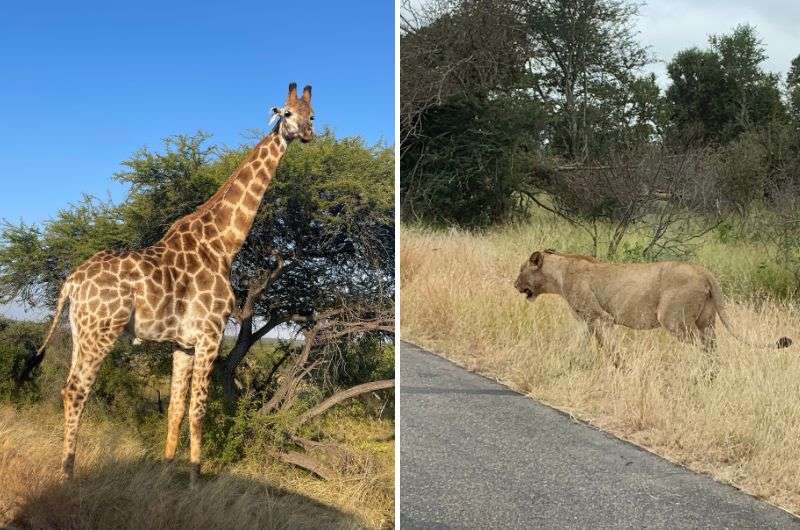
Seeing animals up close like this was fascinating. But remember, this is the wilderness, not a toy store
- First, let's address the lion incident. Picture my girlfriend, overwhelmed with excitement, almost hanging out of the car window just a mere 3 m (10 ft) away from a lion. Oh, the thrill! I swiftly intervened and reminded her that close encounters with predators are best left to the Discovery Channel. The lesson here is to keep all your body parts inside of the vehicle at all times.
- Now, here's a little secret about the park entrances. Be mindful of which gate you choose and the area you have to drive through to get there. Some gates are dangerously close to townships, the stuff of nightmares. Take, for example, the infamous Numbi Gate at Kruger National Park. Trust me, you're better off entering the park from the highways, where safety levels are considerably higher. The number of targeted incidents against tourists on the road to Numbi is ridiculous and I can’t see why it’s still being recommended.
- Once inside the park, you can breathe a sigh of relief… well, as long as you're not holding your breath during a bathroom break. The thing is, there are designated areas for answering nature's call. But when the call becomes urgent and there’s no designated are in sight, you'll need a spotter for animals. It goes like this: A quick scan of the surroundings, a count of "1, 2, 3," and off you go, peeing in the wild while praying you aren’t spotted with your pants down by a hungry lion. We've mastered this art on multiple occasions. It’s exciting to say the least.
- Other than that, make sure to drive slowly and admire the animals from a safe and respectful distance. They may seem cute and snuggly, but never underestimate their wild instincts, and resist the urge to reenact scenes from The Lion King. Hakuna Matata, but don’t be stupid about it.
Safety around wild animals in South Africa
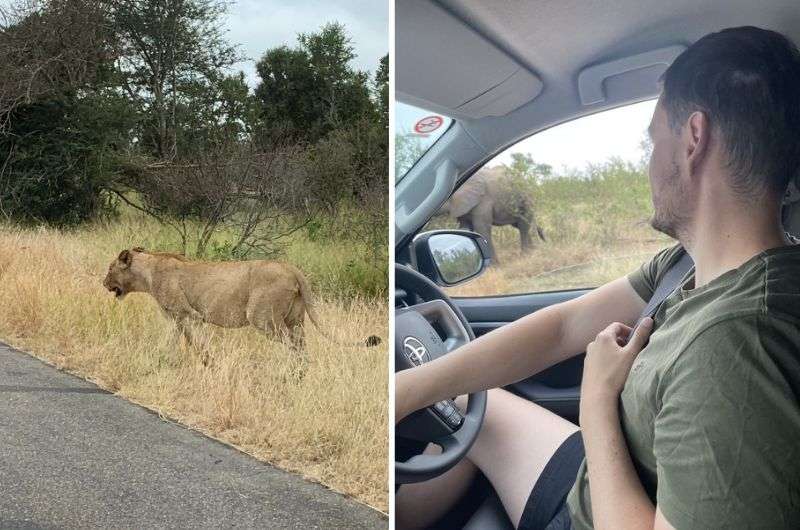
Keep your limbs inside your vehicle at all times
While animals aren't inherently dangerous anywhere in the world (I’d watch out more for humans), there are times when they can be more hazardous than in your home country, and South Africa happens to be one of those places.
Throughout my travels, I've gathered some useful tips to stay safe:
- Make noise. Most animals are more dangerous when you surprise them, so making noise will alert them to your presence and prevent any unpleasant shocks to their system. Once they know about you, they’ll probably take cover. Sorry, animals usually couldn’t care less about meeting you in person—especially snakes and spiders.
- If a snake has a diamond head do not approach—it’s a viper. If it looks like a cobra, it’s probably a cobra. Again, don’t go getting a selfie with it. Honestly, if you can’t tell the difference between a cobra and other snakes you probably shouldn’t be hiking in South Africa in the first place. All jokes aside, the dangerous snakes usually keep their heads up and hiss at you. The less dangerous snakes freeze.
- Another good rule is that carnivores are generally scarcer and much less dangerous than herbivores. Think rhinos, hippos, elephants, buffaloes etc. You don’t want to be chasing photo ops with those heavyweights.
- Don’t lean out from your car window while driving in safaris if you value your limbs and head). For a lion, your arm could look as tempting as your iPhone for that thug in Cape Town.
- Don’t go into forests at nighttime—there are wolves!! Just kidding. There are leopards and they are way more dangerous than wolves.
- Don’t ignore the signs that say, “Baboons are wild animals, do not approach”. You will meet a lot of them and sometimes really unexpectedly. You’ll understand the signs once you see them—they’re pretty menacing. And if you do approach, well, you’re probably totally stupid and deserve to be bitten.
- Finally, some obvious advice—don’t take a swim in the rivers in northern South Africa, there are crocodiles there. Crocodiles are extremely dangerous and can catch a bird while flying, so unless you are faster than a bird, you probably shouldn’t be swimming in crocodile-infested waters.
Load shedding
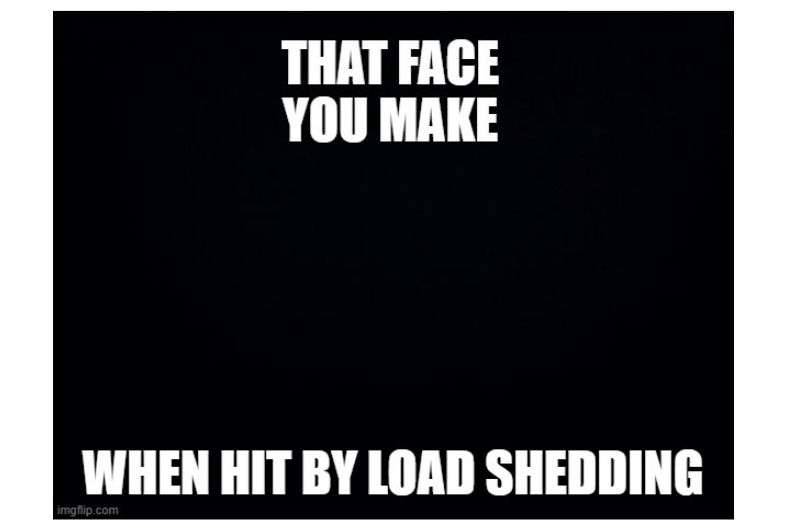
- Load shedding is like the ultimate surprise party South Africa likes to throw its visitors. You might even call it electrifying... it’s a rolling, pre-planned power outage.
Officially, it's all about how the rapid growth in population has caused strain on the electricity supply, so they plan power outages to make sure they don’t run out of juice completely. Sounds, fun, right?
As plausible as that official version sounds, you have to remember that this is Africa, so there's probably more to this tale. Sure, the population grew rapidly. But somewhere along the way, someone may have misplaced the funds for electric infrastructure and proper maintenance. Oops!
- So now, the country plays a little game of "Lights On, Lights Off", leaving you guessing when the power will return. Sometimes the blackout takes just a couple of hours, sometimes it takes 16 hours at a time. See, fun! You can Google the load-shedding schedule for your cities prior to arrival so you know what to expect.
- Large and high-end hotels and restaurants have power generators, so if you don’t want to be left in the dark halfway through your shower, check beforehand what the situation is at the place you plan to stay in.
Hotels I recommend in South Africa:
Little Kubu Lodge (Panorama Route)
Safari Moon Luxury Bush Lodge (Kruger NP)
Kanonkop House (Garden Route)
Home Suite Hotels Station House (Cape Town)
Cathedral Peak Hotel (Drakensberg)
Food and water safety
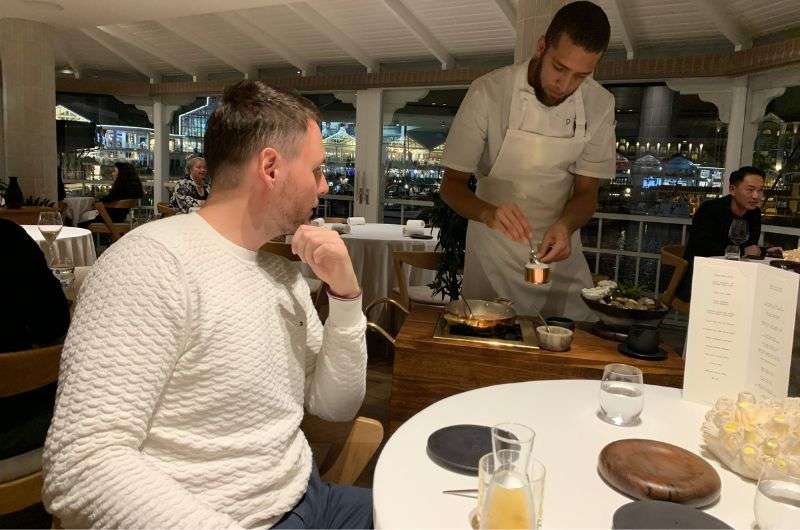
I really enjoyed the South African restaurants
One thing’s for sure—you’ll need to keep yourself fueled to navigate all that South Africa throws at you! I’m talking national parks, wild animal encounters, incredible hikes and even epic drives. Can you drink the water in South Africa? Will you get food poisoning? Well, let me tell you:
- Unlike some other African countries (yes, Namibia, I'm looking at you), South Africa's tap water is potable, so you can hydrate without a worry in the world. No need to fear that dreaded traveler's tummy ruining your fun (like that time Mexico made my transatlantic flight to Europe a nightmare).
- Still, to be on the safe side, I would buy my water in places like national parks and safaris in South Africa. Sometimes, pollution can sneak its way into the water supply.
- Now, let's talk about one of my favorite topics—food! In summary, South Africa will have your taste buds dancing with joy. The culinary scene is a delight, boasting some of the best restaurants I've ever had the pleasure of dining in. But here's the deal—don't expect cheap to be the key to happiness in the food department. As with anywhere else in the world, you get what you pay for. Check Google reviews of restaurants before you book a table for dinner, and steer clear of street food.
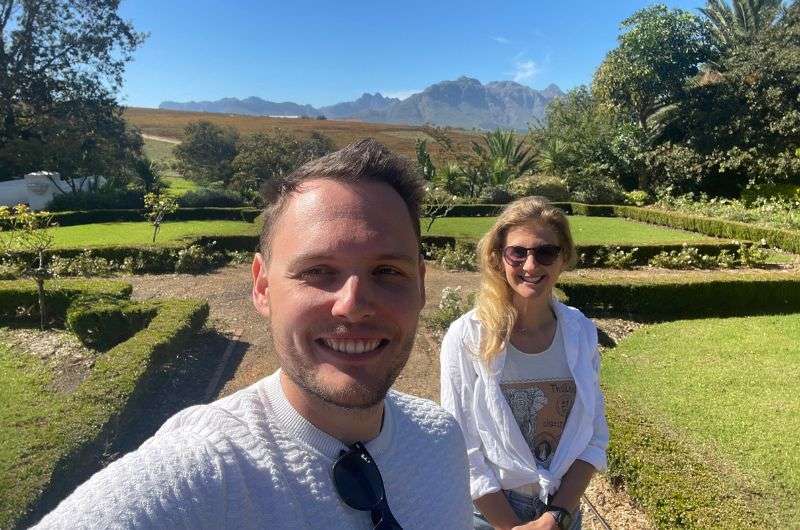
We love South Africa!
You see, it’s a lot, but it’s not really anything that should deter you from traveling to South Africa. The country is one of the most spectacular on my list, and you’d seriously be missing out if it were on for safety concerns. Be a smart traveler and you’ll (most likely) be safe in South Africa.
This post contains affiliate links. I earn a small commission if you make bookings through my links, at no additional cost to you. This helps keep this blog free, thank you!


Comments | Thoughts? Give us a shout!
Recommended articles
Can you do the South Africa Itinerary in only 2 or 3 weeks? Absolutely! Just know that it probably won’t be your last trip to the Rainbow Nation, and that you’ll finish your vacation feeling like you've sprinted through a marathon.
Cape Town is one of my favorite cities in the world, all thanks to its nature, climate, and people. You gotta love a city with a towering 1,000-m mountain right in the middle of it and the Western Cape sprawling all around!
So, you're thinking of skipping the usual touristy spots this year and you fancy a bit of real adventure, huh? Look to South Africa! It's that one destination where you won't feel like you've seen it all before.
About me
Hi, I’m Jan. I travel fast and intensely, whether I’m exploring the buzz of Tokyo in 3 days or road-tripping through mountains and beaches on a 3-week Thailand adventure. And no matter where I am, you’ll always find me in a comfortable hotel at night and eating the best food.
If that sounds like your kind of journey, hop on board, and let’s explore the world together!
I started this blog after realizing how tough it can be to find reliable, authentic travel info. You wouldn’t believe how many “travel bloggers” never even visit the places they write about! On Next Level of Travel, you can count on my full honesty and insights drawn from my firsthand experiences.
More about meHere’s the deal: not every destination is all superlatives and unicorns. I’ll let you know if a tourist attraction isn’t worth your time, like skipping overrated stops in my 2-week Spain itinerary. And when I find something truly special—like the perfect mix of culture and nature in Cape Town—you can trust that it’s worth adding to your itinerary.
Next Level of Travel s.r.o.
ID: CZ07036612
Adress: Voctářova 2449/5, Praha, Czech Republic
Created by myTimi